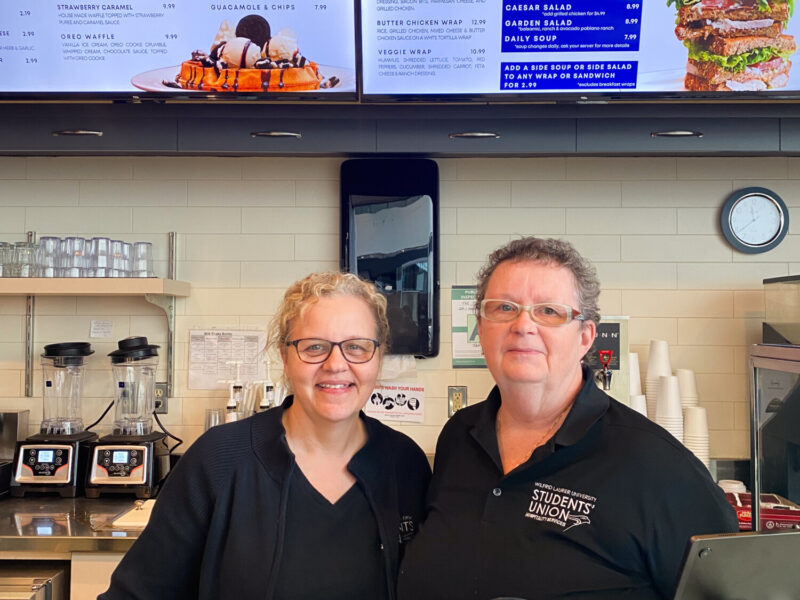Tensions are rising across the province as Oct 30 marks the third week of the Ontario college strike.
And yet, the crowd of Conestoga instructors protesting outside Odeon is a big as ever, if not growing.
The strike is a result of the Ontario Public Service Employees Union (OPSEU) and the College Employer Council (CEC) being unable to come to an agreement during negotiations.
OPSEU, which has over 130,000 members and a strike fund of over $70 million, represents the 12,000 instructors on strike.
According to the Globe and Mail, OPSEU states that the number of part-time positions in colleges has gone up by 40 per cent in the last decade, while full time positions have increased by less than 20 per cent. This leads to 70 per cent of all college teachers being part-time employees, and a lack of assured job security.
“Well there are about three main causes that we have and are concerned about as the Faculty of Ontario Colleges. I think the chief one for all of us, and we were talking about it today, is fairness for part-time contract faculty. We’ve basically seen in the past decade, really, much more use of precarious work in the education system,” said Russell Foubert, Professor of Software Engineering Technology at Conestoga College.
“The management feels they have reasons for relying heavily on part-time work, and those are management’s reasons; what we see as full-time, part-time, and other contract faculty is the effect it has on student learning outcome. So being able to know that your college and university programs are being tended to by full-time professors is really important. You know, those people that are consistently motivated and interested in keeping things fresh, up-to-date, et cetera… And you don’t get that with part-time staff who might not be here four months from now. So that is a big issue.”
According to the Employer Council, the union’s demands would increase the cost of running schools by $250 million.
Both sides of the table report feeling that their issues have not been addressed, and while both parties state that they are willing to return to negotiations, no further meetings have been scheduled.
The Toronto Star reports, “the College Employer Council says it upped its salary offer to 7.75 per cent over four years, putting full-time teachers at a maximum of $115,378. Those with a partial teaching load — between seven and 12 hours each week — would make a maximum of $154.26 an hour.”
Additionally, the council states that the union is demanding a 10 per cent wage increase over a period of three years, which would cost an extra $400 million per year.
Foubert states, “The other issue as well, is that those part-time workers are not compensated for all of the hours that they put in. They are given what appears to be really attractive hourly rate, but that rate is only for a three-hour class. So, it may be, let’s say, $75.00 per hour, but that’s only times three hours per week, and that does not give them anything when you factor in all the marking, prep hours, or the unfortunate circumstance where you might have to deal with academic misconduct. That takes hours of the part-time professors’ and contract teachers’ own pocket. And so, you’ll see what looks like a really good hourly rate actually gets diluted, to in some cases, we have part-time faculty making less than minimum wage.”
While the strike involves colleges and instructors, students are directly impacted. Approximately 500, 000 students may lose up to two full weeks of class time. The College Student Alliance, which is one of the only student-focused advocacy groups, is working to put public pressure on OPSEU and CEC to come to an agreement.
While students are not part of the negotiations, many feel that they are being left out of the dialogue completely.
Conestoga student Marissa White, states, “I think that the situation in its entirety is disheartening. It is disheartening for the students, and for the staff and the faculty of each college involved. At this point, I can’t even formulate my own opinion on the cause for which the colleges are striking because the students have been excluded from the dialogue.”
While students have never lost a full semester due to a faculty strike, the effects of a prologue strike can be strenuous on students.
“If it continues, the possibility of an extension of the semester would require me to extend the lease of my student house in April; delay my move home; severely impact my chances of starting a full-time summer job at the beginning of the summer – further adding financial and personal burdens on me as a student. The worst of all of this, however, is that if the strike continues, as a fourth year student, I will not be able to graduate on time which is completely heartbreaking for me,” states White.
Foubert shares the concern of students and expresses that instructors would like to get back to teaching. He states, “Now it is a huge concern for all of us; there are many remedies and many ways for us to be able to manage [lost time] when we go back. Some of it’s going to be not so regulated, but some of the solutions on how students will be able to stay on track in their studies will come out at the college level”
“The administration will put down some new guidance for us to follow in the classrooms in terms of how to complete all the evaluations for the school year. In some cases, as a professor, it’s going to be up to me to be able to say, you know, maybe I used to give three assignments and two tests, and [instead], it’ll be two assignments and two tests. Maybe just a different combination of evaluations, that will still prove that the student will meet the outcomes of the course, and then we can wrap it up successfully.”
While there will be options to help students complete their programs, these solutions are not an ideal fit for everyone.
“I do think that there are programs where [that might not work], such as some trades and apprenticeship programs, some of the paramedic and police services training programs. And they have valuable experiences, like ride-alongs and things like this, that will be sacrificed and might not be there. So it is really a concern for all of us,” states Foubert.
This sentiment is echoed by worried students.
“Thus far, the strike has been frustrating solely from an academic and financial standpoint. Given the nature and intensity of information, readings, and group projects of the Human Resources Program, when the strike is over the students will be completely and utterly overwhelmed. We will not get those classes back, nor will we be refunded. And what we will receive, will be stripped down or ‘streamlined’ as one of my instructors told us,” states White.
As the end of the third week approaches, Premier Kathleen Wynne warns both the council and the union to come to an agreement, as she states that she is not ruling out back-to-work legislation.
Wynne said, “We really do not want students to lose their term. And you know my expectation and the [post-secondary] minister’s expectation is that both sides of this negotiation will find a way to get back to the table to re-engage because that’s where the agreement has to be forged,” during an event in downtown Toronto as reported by the Toronto Star.




